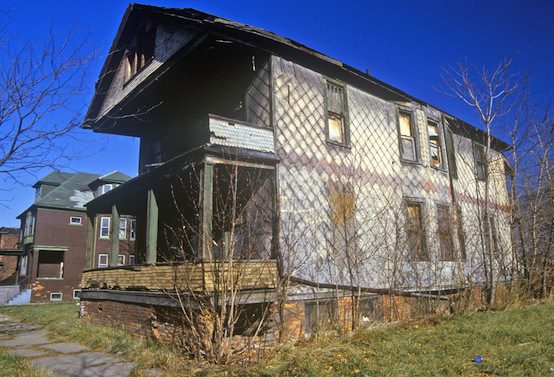“American society as a whole can never achieve the outer-reaches of potential,so long as it tolerates the inner cities of despair." — Jack Kemp #urbanconservative
Tuesday, June 10, 2014
Akindele Akinyemi: Urban Conservatism
Sunday, June 8, 2014
Detroit & The Urban Machine

Ohio has a Rust Belt problem, too. On two occasions (2002 and 2004) I was the Republican candidate for state representative in a portion of Ohio’s Rust Belt, encompassing Lorain, Oberlin, parts of Elyria, and the vicinity. I didn’t win the elections, as one would expect in such Democrat bastions, but I had a chance to think long and hard about remedies for Rust Belt decay as I drew up my own economic development plans for the district I hoped to represent.
It would take a book to detail each facet of what I envisioned, and even my own blog, to date, contains only a fraction of my proposals, so I don’t plan to elaborate much within this thread (it’s already a wall of text, as it is), but my approach to urban renewal differs from most other approaches I’ve come across. My approach is different because my assessment of the causes of the decay are different. While I readily agree that Detroit’s economy must be diversified to counter the prevailing trend, I do not think that the auto industry is at the root of the decay at all.
Attitudes are at the root of the decay.
Republicans Can’t Win America if They Lose the Cities

It would be tough to find a more pressing symptom of the party’s demographic challenge than the decline of the iconic Republican Mayor. Symbols of pragmatic, sensible leadership, Republican mayors formed a powerful link to the party’s Hamiltonian capitalist roots. Our countryside is continuing to empty as more and more Americans build a life in the city. Rebuilding a competitive urban agenda will be a critical key to building a 21st century GOP.
The decline of the party’s influence in urban areas is particularly shocking for how quickly it has developed. Outside of the machine politics of Boston, Chicago and Philadelphia, Republicans were regularly competitive in most of America’s major cities until the late sixties.
During that decade, cities like Detroit, San Francisco, New York, Dallas, and Los Angeles all had Republican mayors. Beyond the urban core Republicans in all of America’s big cities remained a potent, sometimes unchallenged force in suburban politics until the last few elections.
Monday, June 2, 2014
Mick Cornett: How an obese town lost a million pounds
Mayor Mick Cornett (born July 16, 1958) is the current mayor of Oklahoma City, Oklahoma, United States, having served in that position since 2004. He is only the fourth mayor in Oklahoma City history to be elected to three terms and the first to be elected to four terms. He also serves on notable positions including the national President of the Republican Mayors and Local Officials (RMLO), and also serves on the Board of Trustees for the U.S. Conference of Mayors. He was also Chairman of the U.S. Conference of Mayors Urban Economic Affairs Committee until 2007. He is a Republican.
City Journal - The Childless City
What is a city for? Ever since cities first emerged thousands of years ago, they have been places where families could congregate and flourish. The family hearth formed the core of the ancient Greek and Roman city, observed the nineteenth-century French historian Fustel de Coulanges. Family was likewise the foundation of the great ancient cities of China and the Middle East. As for modern European cities, the historian Philippe Ariès argued that the contemporary “concept of the family” itself originated in the urbanizing northern Europe shown in Rembrandt’s paintings of bourgeois life. Another historian, Simon Schama, described the seventeenth-century Dutch city as “the Republic of Children.” European immigrants carried the institution of the family-oriented city across the Atlantic to America. In the American city until the 1950s, urbanist Sam Bass Warner observed, the “basic custom” was “commitment to familialism.”
As Detroit Prepares for Clear-Cutting, Signs of Hope
Detroit's collapse may have reached the point of providing clear ground for new growth:
 |
Yesterday an Obama administration-convened task force released what the New York Times called “perhaps the most elaborate survey of decay conducted in any large America[n] city,” detailing the pervasiveness of perceived blight in the Motor City. The Detroit Blight Removal Task Force surveyed 377,603 properties, and recommended 40,077 for demolition, 38,429 for further review. Task force leader Dan Gilbert set the stakes somewhat colorfully, saying, “Blight sucks the soul out of anyone who gets near it.” In order to fully follow the task force’s clear-cutting recommendations, Detroit would need to spend at least $850 million, almost twice the $450 million the city has already planned to spend on blight.
Read more: http://www.theamericanconservative.com/as-detroit-prepares-for-clear-cutting-signs-of-hope/
Subscribe to:
Comments (Atom)

